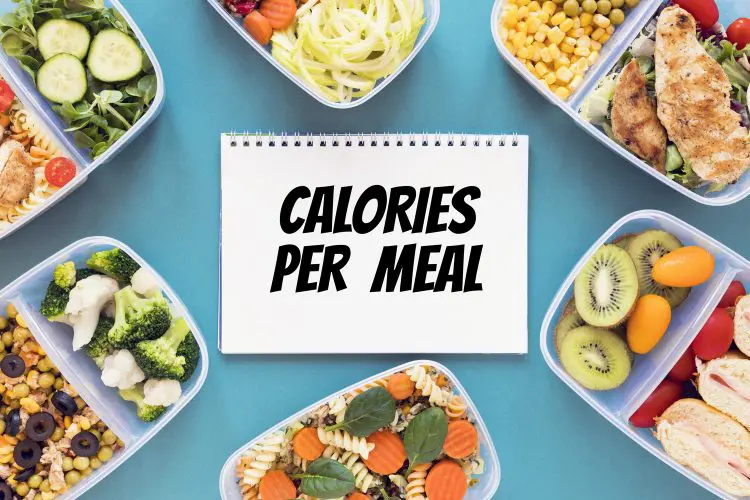Meal Calorie Calculator
Enter the number of total daily calories you'll be eating (1200 or more).
Effectively Spread Out Your Calories Throughout The Day
Most people eat several times per day regardless of their goals. But if you are trying to lose, gain, or maintain your weight, you more than likely aim for a certain daily caloric number (or at least you should).
Let’s say you need to consume 1,600 calories per day to lose weight. Very few people will eat all those calories in one sitting. Instead, they divide it up into multiple servings.
Well, the calories per meal calculator can also do that. In fact, it’ll help you to portion out both your meals and snacks too.
What Is The Calories Per Meal Calculator and Why Use It?
The calculator is simply a tool that divides your total daily caloric intake into manageable servings. But the real question is what are the benefits of spreading out your calories over the course of each day.
Feel better throughout the day
Eating a few times per day gives us the energy to sustain our activities and prevents us from passing out, especially those who are very active.
But eating smaller meals throughout the day to reach your caloric requirements can prevent digestive issues, bloating, and other undesirable effects.
Prevent overindulging
A lot of people go many hours without eating anything and as a result, when they do get some food, many times they don’t make the best choices.
When you’re starving and don’t have discipline, it’s easy to reach for the wrong stuff and go ravenous.
If you put something small in your stomach when you get hungry this is less likely to happen.
Performance support
Whether you weight train, run, play sports, or do any activities, eating more frequently can help fuel us for the sessions and help us to recover afterward.
Additionally, many need an intra-workout snack to maintain the same level of effort and train longer.
Simply eating once or twice isn’t going to cut it for the most active individuals. They need lots of carbohydrates throughout the day to sustain performance and protein to repair muscle breakdown.
Also, overtraining is a real thing and nutrition is an essential component of preventing it. Not to mention, inadequate nutrition may aid in injury and it certainly isn’t ideal for recovery.
Feed muscles
The calories per meal calculator will split up your protein intake per meal so that you can have an equal dose to feed your muscles throughout the day. This is especially important if doing resistance training.
Now, there’s a belief that the body can only absorb a certain amount of protein per meal. But it’s not really that simple as there are several factors involved.
You may have heard that 20-25 grams of protein per meal is optimal for muscle anabolism and that anything else isn’t used by the body (1).
But a 2018 study explained that the findings of this belief are specific to fast-digesting proteins without additional macronutrients.
Instead, slower-digesting proteins with other macronutrients slow digestion and maximize the use of amino acids that are essential for muscle growth.
But there are benefits to consuming fast-digesting proteins right after a workout and throughout the day. The biggest is that it has a greater initial effect on muscle protein synthesis (building of proteins).
So it really depends on how your diet is and maybe you can make a guesstimate as to how much protein may be good for you. It’s not something to really overthink but just find your ideal daily protein intake and ensure you hit it.
Read: How Much Protein To Gain Muscle? A Simple Guide To Optimal Gains
You’ll probably never know exactly how much protein your body is utilizing per meal though. But the above information is helpful nonetheless.
Does eating several small meals per day accelerate weight loss?
Chances are that somewhere along your weight loss journey, someone has told you this or you’ve heard this from somewhere.
What we can tell you is that there are mixed beliefs about the relationship between eating several meals per day and being a fat-burning machine.
But according to research, having several meals spread out does not boost the metabolism any more than eating fewer meals with more calories. In fact, the terminology used was there was no difference between nibbling and gorging as it relates to preventing fat gain (2, 3).
So for example, there doesn’t seem to be a significant difference between eating 3 meals of 400 calories and 6 meals of 200 calories.
The better thing to do would be to focus on meeting your daily caloric requirements to achieve your goals.
Your daily schedule, fluctuations in appetite, and access to food are also determining factors in how you eat.
Does eating several times per day help control blood sugar?
Another common belief is that spreading out your meals helps to maintain healthy blood sugar levels.
Well, this may be true to an extent. For instance, eating one large meal will raise glucose levels, and after it comes back down, energy levels may as well.
But eating two or more meals may be a bit better and keep things more stable. Hence why you may feel like passing out going for hours without eating anything and experience a drop in blood sugar.
But it also depends on what you eat, and your goals.
Healthier food choices are obviously going to make you feel better and are better for your blood sugar health.
Additionally, research has shown that eating a good breakfast sets the tone for the day. But we don’t necessarily need studies to tell us that.
Think about when you skip breakfast and feel awful throughout the day even if you eventually have several meals.
But according to information by the Endocrine Society, a high-energy breakfast followed by smaller subsequent meals promotes weight loss, improves diabetes, and decreases the need for insulin in people with Type 2 diabetes. It also helps to reduce hunger cravings and daily blood glucose levels.
This was compared to having 6 smaller meals throughout the day.
Researchers also concluded that when was more important than what as it relates to the types of foods consumed. For example, eating something like bread would be better in the morning than in the evening.
This is because the metabolism fluctuates throughout the day and there’s less of a glucose response in the morning compared to in the evening.
But there’s also research that shows eating less frequently promotes satiety and reduces hunger which makes sense (4).
Have you ever noticed that when you eat more often throughout the day you feel hungrier sooner?
Again though, your lifestyle, goals, and health are factors that determine your eating regime. There’s not necessarily a perfect one-size-fits-all strategy.
How To Use The Calories Per Meal Calculator
Before you use the calorie calculator, it’s important that you know how many calories you need per day based on your goals.
You can use our calorie calculator or macro calculator to learn your optimal caloric intake.
You’ll then type in the number of calories you consume every day. Note: it must be at least 1,200 calories.
Next, you’ll type in the percentage of each macronutrient (protein, carbohydrates, and fat) you require. Use the macro calculator linked above to find this number.
Calorie Breakdown Per Meal
Finally, choose your meal breakdown or how many meals/snacks you have every day.
The options are:
- 3 meals, 2 snacks
- 3 meals, 3 snacks
- 5 meals split equally
- 6 meals split equally
- 5 meals, tapered calories
- 6 meals, tapered calories
The calculator will then provide you with a calorie and macronutrient breakdown based on the number of meals.
You can then either count your calories and macros for each meal or use some sort of app like MyMacros or MyFitnessPal where you can create your own meals and not have to count each time.
How To Keep Yourself On Track With Your Daily Calories/Nutrition
OK, so now that you have an idea of how to spread out your calories, how do you maintain this?
Use a tracker
Again, a good nutrition tracker/tool like MyMacros and MyFitnessPal are great for this purpose. You can create meals with the ideal calories and macros and track your daily eating habits.
Prep your food
Take one or two days out of your week and prepare your meals and snacks. This makes it much easier to grab and go. When you have to cook every meal, it becomes much too tempting to deviate from the plan and many fail by falling off track.
Remember the saying “If you fail to plan, you plan to fail”.
What is the desired outcome?
This is a question that we need to always ask ourselves regardless of our goals.
It’s good to have a mental image or idea of what we want. Do we want to look better in a bikini, be more muscular, get stronger for sports or just improve our health?
Nutrition is crucial for performance, achieving your goal physique, and your well-being.
Other related calculators
- Weight Loss Calculator
- Calorie Deficit Calculator
- Carb Cycling Calculator
- Calories Per Meal Calculator
- Intermittent Fasting Calculator
- Water Fasting Weight Loss Calculator
- Weight Gain Calculator
Reach Your Goals With The Calories Per Meal Calculator
The calories per meal calculator isn’t some miracle tool but it can help you to maintain structure with your daily caloric intake.
There are certainly advantages to dividing up your meals and snacks which we went over, so you can use this as a way to keep yourself on track and provide yourself with the energy to get through your day and activities.
References:
- Schoenfeld BJ, Aragon AA. How much protein can the body use in a single meal for muscle-building? Implications for daily protein distribution. J Int Soc Sports Nutr. 2018 Feb 27;15:10. doi: 10.1186/s12970-018-0215-1. PMID: 29497353; PMCID: PMC5828430.
- Bellisle F, McDevitt R, Prentice AM. Meal frequency and energy balance. Br J Nutr. 1997 Apr;77 Suppl 1:S57-70. doi: 10.1079/bjn19970104. PMID: 9155494.
- Cameron JD, Cyr MJ, Doucet E. Increased meal frequency does not promote greater weight loss in subjects who were prescribed an 8-week equi-energetic energy-restricted diet. Br J Nutr. 2010 Apr;103(8):1098-101. doi: 10.1017/S0007114509992984. Epub 2009 Nov 30. PMID: 19943985.
- Munsters MJ, Saris WH. Effects of meal frequency on metabolic profiles and substrate partitioning in lean healthy males. PLoS One. 2012;7(6):e38632. doi: 10.1371/journal.pone.0038632. Epub 2012 Jun 13. PMID: 22719910; PMCID: PMC3374835.
Tip: If you're signed in to Google, tap Follow.



















